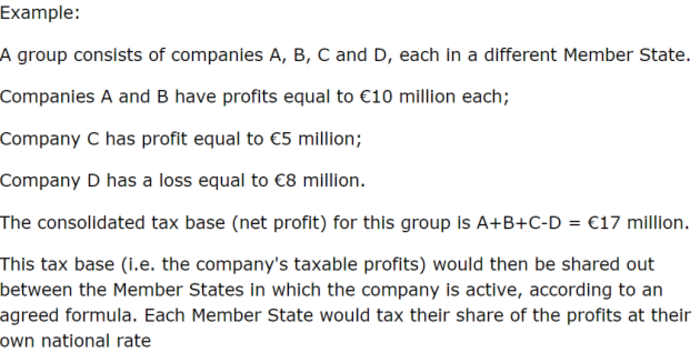The EU has pledged its new rules will stamp out tax avoidance by big companies
But the plans are likely to get an unenthusiastic response from the Irish government.
THE EUROPEAN COMMISSION has pledged that new rules unveiled by the organisation today will clamp down on tax avoidance by big multinational firms.
The commission also said that the plans will stop large companies funneling money out of the EU in an effort to avoid tax.
The EU Common Consolidated Corporate Tax Base (CCCTB) is a single set of rules that companies operating within the EU would use to calculate their taxable profits.
The plan is split into two key parts. The first section, relating to a common ‘base’, would mean that a company would have to comply with just one EU system for working out its taxable income, rather than looking at different rules in each EU member state in which they do business.
The second part, which is likely to prove more controversial, is the ‘consolidated’ base. Under this part of the proposal, companies with operations across several different EU member states would file a single, ‘consolidated’ tax return with one administration for their entire activity within the EU.
On the basis of this tax return, any tax paid by the business would then be shared out among the member states in which it is active.
Controversial
This part is likely to be the more controversial aspect of the plans. As previously explained by Fora, some, such as Fine Gael MEP Brian Hayes, have suggested that if the consolidated base is introduced, a single tax rate could follow.
This could be hugely damaging for Ireland, which relies heavily on its low corporate tax offering to attract foreign investment.
However, the EU has said that it is crucial that the ‘consolidation’ aspect of the plan is implemented in an effort to constrain certain techniques used by multinationals to avoid tax such as transfer pricing – a practise we’ve also previously examined.
 An example of how the 'consolidated' tax base would work
An example of how the 'consolidated' tax base would work
Making the announcement today, the European Commission said that the common base “can be applied while consolidation is being negotiated and will already bring some important improvements to the EU’s corporate tax environment”.
However, it added: “Consolidation remains a firm goal and should be taken up by the (European) Council as soon as the common base is agreed. “
The proposals would be mandatory for companies with a global turnover of more than €750 million.
“Large groups will not be able to opt out of the watertight CCCTB system simply to continue aggressive tax planning,” the commission said.
Mismatches
Also likely to be of key importance is a measure that is designed to stop companies from moving their money out of the EU.
Currently, many companies that practise aggressive tax planning to cut their tax bills do so by taking advantage of mismatches in law between different countries.
The EU’s Anti Tax Avoidance Directive, which was agreed in June and welcomed by the Irish government, was designed to clamp down on businesses taking advantage of mismatches between laws in EU member states. The commission said its new proposals also tackle this issue.
“If a mismatch with a third country leads to double non-taxation, the company may have to pay tax on certain payments in the EU which it normally would not have to or may no longer be able to deduct certain payments,” it said.
“Common rules for taxing companies in the EU will remove the loopholes and mismatches in the current corporate tax frameworks which enable aggressive tax planning.”
Investment
The organisation also claimed that the new rules “can lift investment in the EU by up to 3.4% and growth by up to 1.2%”.
The CCTB is an amended version of a set of plans first floated in 2011. The proposals failed to gain traction then due to opposition from Ireland and the UK, along with several of the Baltic States and Germany.
The UK’s vote to leave the EU will, however, limit its influence on the new plans.
The commission also said that the new rules will encourage companies to finance their activities “through equity and by tapping into markets rather than turning to debt”, and added that there will be EU-wide tax credits for research and development activity.






